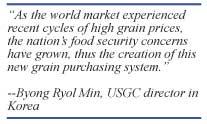In response to growing concerns about food security, Korea recently announced the creation of a national grain procurement system. The newly created consortium is comprised of five major parties, including…
Korea Agro-Fisheries Trade Corporation, a government-invested entity and a key player of the consortium; CJ CheilJedang Corporation, a feed miller and food manufacturer; Samsung C&T Corporation, a general trading company; STX, an export elevator investor; and Hanjin Shipping.
According to the agreement, the consortium will work with the Korean government, which will provide financial support for the consortium to start the international grain trading business. The consortium aims to secure grains needed for both animal and human consumption and also plans to invest in 10 country elevators and an export elevator in the United States.
“Through this new system, the parties hope to import 50,000 metric tons (2 million bushels) of corn and 50,000 tons (1.8 million bushels) of soybeans in 2011,� said Byong Ryol Min, USGC director in Korea. “By 2020, they plan for this system to secure 30 percent of the nation’s total imports which would include diversifying origin by investing in grain production and marketing chains in Brazil, the Ukraine, the Maritime Province of Siberia and other countries.�
According to Min, the Korean government worked with the private sector to complete a total of 44 survey projects studying the economic and technical feasibility of developing feed grain bases in 22 different countries, including the United States. Despite these ambitions, Korea has not yet been able to make overseas grain production and marketing chains a significant reality.
Yet, with a population of 50 million people living on 24.6 million acres of land, the issue of arable farmland remains a concern for the government. Only 4.3 million acres or 17 percent of Korea’s total land is currently available for farming, creating a grain self-sufficiency ratio of 27 percent.
“As the world market experienced recent cycles of high grain prices, the nation’s food security concerns have grown, thus the creation of this new grain purchasing system,� Min said.
Korea is an important customer to U.S. producers, and the country continues to look to the United States to fulfill its grain needs. From January to November 2010, Korea imported 6.6 million tons (261.56 million bushels) of corn and 370 tons (15,000 bushels) of sorghum from the United States in addition to purchases of feed wheat, rye and oats.


